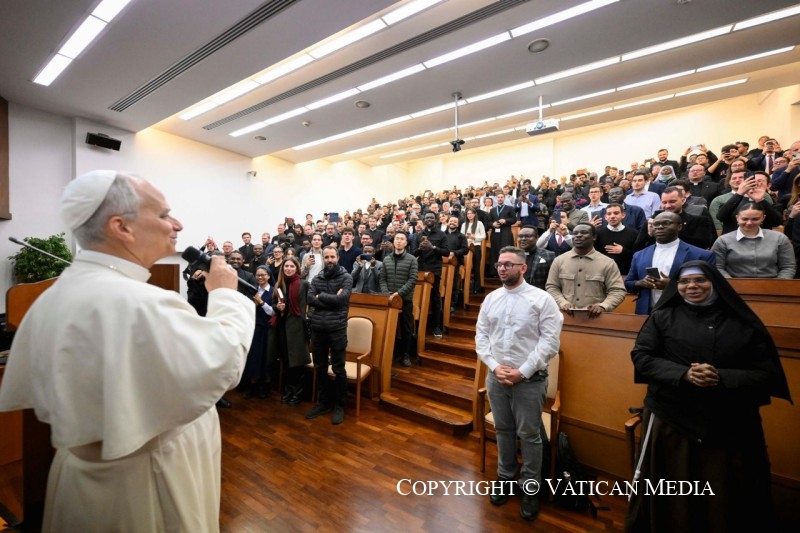At the Lateran University, Leo XIV calls for thinking to counteract emptiness
At the start of the university’s academic year, the pontiff addressed the "pope's University”, which has students from around the world and associated institutes in Asia. In his speech, he called for training peace workers and justice advocates. He stressed the value of scientific studies to counter the idea that they are useless for pastoral work. In fact, the Church needs lay people and priests who are “prepared and competent”.
Rome (AsiaNews) – Pope Leo visited the Pontifical Lateran University for the inauguration of its 2025-2026 academic year, the 253rd since it was founded by Pope Clement XIV in 1773, and which has a very special bond with the successor of Peter by statute.
In his address, the pontiff said that, “we have an urgent need to reflect on faith in order to be able to articulate it in relation to current cultural scenarios and challenges, but also to counter the risk of cultural emptiness which, in our era, is becoming increasingly pervasive.”
“Unlike other distinguished academic institutions, including those in Rome, this University does not have a founder's charism to preserve, deepen and develop, but its particular orientation is the teaching of the Pope,” Leo said.
At the Lateran University, through 28 associated institutes in three continents (Europe, Asia and America), “academic reflection, inspired by the Petrine charism, opens itself to interdisciplinary, international and intercultural perspectives”.
Reviewing the areas of study offered at the university, from theology to philosophy, including canon and civil law, Leo focused on programmes established in recent years in Peace Sciences and Ecology and the Environment.
For the pontiff, “The issues they address are an essential part of the recent Magisterium of the Church, which, established as a sign of the covenant between God and humanity, is called upon to form peacemakers and agents of justice who build and bear witness to the Kingdom of God.”
Indeed, “Peace is certainly a gift from God, but at the same time it requires women and men capable of building it every day and supporting processes towards an integral ecology at the national and international levels. I therefore ask my University to continue to develop and strengthen these two study programmes at the inter- and trans-disciplinary levels and, if necessary, to integrate them with other courses.”
Leo XIV focused on some “particular dimensions” of the missions pursued by universities. First and foremost, they must train people about the principles of "reciprocity and fraternity," which at the Lateran University involve students, faculty, and staff from all five continents.
“Today, unfortunately, the word ‘person’ is often used as a synonym for ‘individual’, and the appeal of individualism as the key to a successful life has disturbing implications in every area: people focus on self-promotion, the primacy of the self is fuelled and cooperation is difficult, there is a growth in prejudices and walls against others, especially those who are different, the service of responsibility is exchanged for solitary leadership and, in the end, misunderstandings and conflicts multiply. Academic training helps us to move away from self-referentiality and promotes a culture of reciprocity, otherness and dialogue.
The pope also underlined the scientific nature of the studies.
“Academic service is often not given the appreciation it deserves, partly because of deep-rooted prejudices that unfortunately also exist within the ecclesial community. Sometimes there is a perception that research and study are not useful for real life, that what matters in the Church is pastoral practice rather than theological, biblical or legal preparation.”
In reality, “The risk is that of slipping into the temptation to simplify complex issues in order to avoid the effort of thinking, with the danger that, even in pastoral action and its language, we may fall into banality, approximation or rigidity.”
To counter this, “We need lay people and priests who are prepared and competent. Therefore, I urge you not to let your guard down on scientific rigour, pursuing a passionate search for truth and a close dialogue with other sciences, with reality, with the problems and struggles of society.”
In concluding, Leo noted the university's contribution to the common good, saying that, “The goal of the educational and academic process, in fact, must be to form people who, in the logic of gratuitousness and in their passion for truth and justice, can be builders of a new world, one of solidarity and fraternity.”
25/05/2025 16:03







.png)










